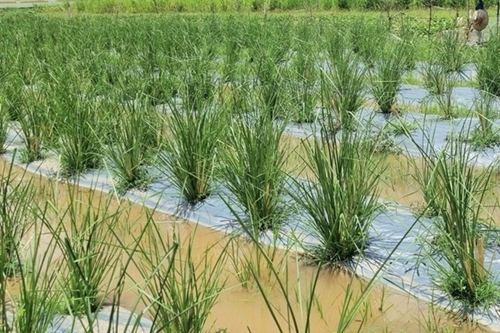The seven students, Vu Hoai Nam (team leader), Nguyen Minh Xuan, Nguyen Trung Hung, Nguyen Ngoc Thanh, Nguyen Thi Quynh Sa, Nguyen Do Hoang Tung and Tran Duc Duy, name the grass vetiver.
    |
 |
|
Vetiver grass (Photo: giaoducthoidai.vn) |
Excessive use of pesticides and other chemicals is a challenge for agriculture, leading to soil degradation and soil pollution and the toxicity can last within the earth, so that plants then re-absorb those toxins.
The research team found that, although there has been a shift to specialized crop cultivation in recent years, many 'dead land' areas are appearing more frequently in the northern mountainous region.
In addition to the overuse of pesticides in farming, unsafe fertilizer sources also cause micro-organisms in the soil and water around the farming areas to gradually die.
So the need for a safe and effective solution to 'clean' up crop growing areas in the northern mountainous areas is an imperative, because it is the agricultural sector that brings in the main incomes.
Nam told giaoducthoidai.vn that the perennial vetiver grass has the ability to effectively absorb toxic minerals from unsafe fertilizer sources or the overuse of pesticides.
“In addition, with its deep and widespread root system, as a giant grass it also has the effect of preventing erosion when grown in areas with steep slopes,” said Nam.
“And with its strong vitality, vetiver grass can survive even in the dry season and does not require much effort to care for.”
The grass also acts as an indicator of soil health, so when planted, it can also be used as a sign of the conditions underground, whether it is fresh or polluted and whether it is suitable for planting.
“With those great attributes, growing vetiver grass in specialized crop growing areas in the northern mountainous provinces to minimize toxic mineral residues in the soil and water environment is a reasonable and necessary solution,” the student said.
According to the team leader, the solution is safe, simple and effective. The grass is being grown in the northern mountainous provinces, specifically in the rose growing area in Lai Chau province.
Because of it being indicator of soil pollution, the grass help farmers recognize when the farming environment is no longer suitable for crop growth and plant elsewhere.
Planting vetiver grass is easy and does not require high-quality human resources or modern equipment, as the grass grows fast and requires little in the way of investment in terms of skills or expertise.
Therefore, it doubly suited to the Northern mountainous region where the majority of the workforce are unskilled, Nam said.
Planting only needs guidance from experts at the beginning, then farmers can help and guide each other, so it could be widely deployed in all regions.
Assoc. Prof., Dr. Nguyen Van Loc, senior lecturer, deputy head of the Food Crops and Agronomy Faculty of the Vietnam Academy of Agriculture, gave high praise to the project because of its potential for immediate practical application.
Source: VNA